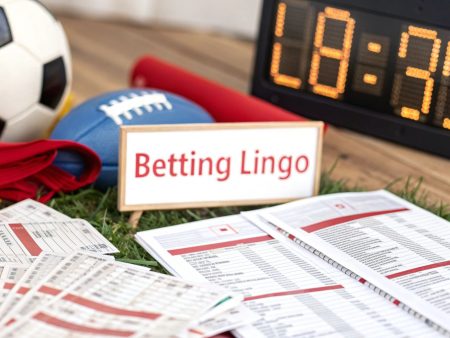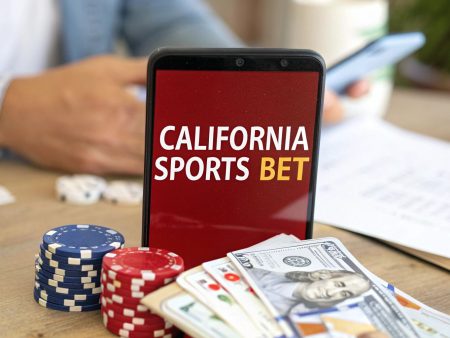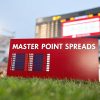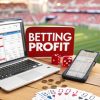Making money from sports betting isn't just a fantasy—it's absolutely possible. But it demands discipline, a solid strategy, and a business-like approach, not just luck. This isn't about the thrill of hitting one massive, lottery-style parlay; it's the slow, steady grind of making consistently smart wagers over the long haul.
A Realistic Look at Making Money from Sports Betting
Let's cut right to the chase: turning a consistent profit from sports betting is tough. Incredibly tough. While offshore sportsbooks like MyBookie, Bovada, and BetOnline offer endless action, the path to actually making money is a narrow one.
This is a world away from blindly backing your favorite team. It's about treating betting as a serious financial venture. If you're dreaming of getting rich quick, you're in the wrong place. The real goal is to adopt the mindset of a professional—someone who analyzes odds, manages risk, and relentlessly hunts for value.

The hard truth is that the vast majority of bettors lose. The global sports betting industry handles over $250 billion in bets every year, but the entire system is designed to favor the house. That built-in commission, known as the 'vig' or 'juice', is usually around 4.5–5%.
Think about what that means. Even if you manage to win exactly 50% of your bets, you're still losing money over time. It's no surprise then that it's estimated less than 5% of all sports bettors are profitable in the long run. If you want more details, you can discover more insights about the global sports betting market and its challenges.
To succeed, you must shift from being a fan who bets to a strategist who invests. This means leaving emotions at the door and making decisions based purely on data, probability, and value.
Key Pillars of Profitable Betting
If you want to join that elite group of profitable bettors, you have to master a few core principles. These aren't just suggestions; they are the non-negotiable foundations of any winning strategy. This guide will walk you through each one, giving you actionable steps to build a durable—and potentially profitable—betting career.
- Bankroll Management: This is the single most critical skill. We'll show you how to properly size your bets to survive the inevitable losing streaks and grow your capital steadily.
- Value Betting: Success isn't about picking winners; it's about finding odds that are mispriced in your favor. You'll learn how to spot true value the pros look for.
- Choosing the Right Sportsbook: Not all books are created equal. Using a mix of sites like BetUS, Sportsbetting.ag, and Bookmaker.eu is essential for line shopping and finding the best prices.
- Disciplined Analysis: Profitable betting requires real research and a consistent analytical process. It's about removing guesswork and emotional bias from every single wager.
The very first step is a fundamental change in your approach. Most people bet like fans, but the pros bet like investors. The table below breaks down the critical mindset shift you need to make.
Mindset Shift From Casual Bettor to Profitable Strategist
| Focus Area | Casual Bettor Approach | Profitable Strategist Approach |
|---|---|---|
| Motivation | Excitement, supporting a favorite team | Finding long-term value, generating income |
| Decision-Making | Gut feelings, emotion, media hype | Data analysis, statistical modeling, research |
| Bankroll Strategy | Bets random amounts, chases losses | Strict unit system, never exceeds set limits |
| View of Losses | Frustration, signs of bad luck | An expected part of the process, data points |
| Sportsbook Use | Uses one favorite book | Has accounts at multiple books for line shopping |
Internalizing these differences is your first real step toward moving from a recreational gambler to someone with a genuine shot at long-term success.
Building Your Foundation: Choosing the Right Offshore Sportsbook
Before you even think about placing that first wager, you've got a crucial decision to make: where are you going to play? Think of your sportsbook as your primary tool. A carpenter needs a quality hammer, and a serious bettor needs a reliable, competitive, and feature-rich platform. This isn't just about finding a website that takes your bets; it's about laying the entire foundation for your potential profitability.
Offshore sportsbooks operate outside of direct U.S. jurisdiction, which allows them to serve bettors across the country. This setup gives them the flexibility to offer some unique perks you might not find elsewhere, like more aggressive bonuses, a wider range of betting markets, and often, better odds. The real trick is knowing how to cut through the noise and find the operators that actually align with your strategy for making money.
What to Look for in an Offshore Sportsbook
Let's be clear: not all sportsbooks are created equal. Some are fantastic for posting early lines, giving sharp bettors an edge. Others focus on massive welcome bonuses or a slick mobile app. Your mission is to find a few top-tier sites that check the boxes for what you need.
Here are the non-negotiables I always look for:
- Competitive Odds and Reduced Juice: The "juice" (or "vig") is the commission a bookmaker takes. Finding a book offering -105 lines instead of the standard -110 might not seem like a big deal, but it can literally save you thousands of dollars over a season. Books like Bookmaker.eu are famous among sharps for exactly this reason—their lines are fair.
- Generous and Clear Bonuses: Welcome bonuses are your best friend for instantly padding your bankroll. But you have to read the fine print. Pay close attention to the rollover requirement—that's the amount you have to wager before you can withdraw bonus funds. A 5x rollover on a $500 bonus means you need to place $2,500 in bets before cashing out.
- Variety of Betting Markets: You need options. While every book will have NFL and NBA lines, the best ones, like Bovada, offer deep menus. I'm talking niche sports, tons of player props, and international leagues you might not have even considered.
- Reliable Payouts and Banking Options: This is a big one. You need total confidence that you can get your money in and out without a headache. Industry leaders such as BetOnline and BetUS have built their reputations on reliable payouts, especially when it comes to cryptocurrencies like Bitcoin.
The single biggest edge you can give yourself is the ability to line shop. Having accounts at three to five different offshore sportsbooks allows you to compare odds for every bet and ensure you're always getting the best possible price.
Comparing Top Offshore Sportsbooks
To give you a real-world idea of how this works, let's compare some of the industry's heavy hitters. The goal isn't to find the one "best" book, but to build a small portfolio of sportsbooks you can use to your advantage.
If you're a bonus hunter, MyBookie should be on your radar. They consistently roll out some of the most generous sign-up and reload bonuses out there, making it an excellent place to build an initial bankroll. Their interface is also clean and simple, which is a huge plus for newcomers.
On the other hand, a book like Sportsbetting.ag (and its sister site, BetOnline) is legendary for posting lines earlier than almost anyone else. For a sharp bettor, this is a massive advantage—it gives you a chance to jump on a great number before the public money starts pushing it.
For those who value a modern interface and smooth crypto transactions, Bovada really stands out. It has one of the most intuitive mobile platforms in the game and offers a mind-boggling variety of markets, including obscure props and tons of live betting options.
Of course, there are other great options to round out your lineup, like Xbet, BetAnything, Cosmobet, BUSR, and Bet105, each bringing something different to the table. For a more detailed breakdown, our guide on the 5 key factors to consider when choosing an offshore sportsbook goes even deeper.
Ultimately, your long-term success starts right here. By carefully selecting a handful of top-tier offshore sportsbooks, you're equipping yourself with the tools you need to find value, maximize your returns, and give yourself the best possible shot at being profitable.
Mastering Bankroll Management to Stay in the Game
If you take only one thing from this entire guide, make it this: without disciplined bankroll management, you will never make money from sports betting. It’s the absolute, non-negotiable bedrock of long-term success. This isn't just about dodging the bullet of going broke; it's the engine that powers sustainable growth and shields you from the wild swings of wagering.
Amateur bettors ride an emotional rollercoaster. They bet big when they’re feeling it and chase losses when they’re down. Pros, on the other hand, operate with the cold, calculated precision of an accountant. They know winning and losing streaks are just statistical noise. The whole game is having a system that ensures no single loss—or even a string of them—can ever knock you out of the action.
The Foundation of Discipline: Your Betting Unit
The first real step to professionalizing your approach is to stop thinking in dollars and start thinking in units. A unit is just a set percentage of your total betting bankroll, almost always between 1% and 2%. This simple switch is what separates strategic betting from just plain gambling.
Your bankroll is the money you've set aside only for betting. This cash needs to be completely walled off from your rent money, grocery budget, and everything else. So, if your starting bankroll is $1,000, one unit (at 1%) is $10. From now on, every standard bet you place is exactly one unit. In this case, $10.
This flat-betting model builds a crucial buffer. It forces you to be disciplined and rips emotion out of the equation when deciding how much to risk. It doesn't matter if you're on a ten-game heater or a soul-crushing losing streak—your wager size stays the same, protecting your capital.
Bankroll management is your best defense against your own worst instincts. It keeps greed in check when you’re winning and prevents panicked mistakes when you’re losing. The goal isn’t just to win bets; it’s to stay in the game long enough for your edge to actually pay off.
Staking Methods in Action
Let’s put this into a real-world scenario. Picture two bettors, both starting with a $1,000 bankroll. Bettor A uses a strict 1% unit system ($10 per bet). Bettor B just goes with his gut, slinging around $50-$100 a game.
Now, imagine both of them hit a brutal 10-bet losing streak. Trust me, it happens to everyone.
- Bettor A (Unit System): After 10 losses at $10 a pop, his bankroll is now $900. He's down 10% of his capital. It stings, but he’s still very much in the game with 90 units left to fire.
- Bettor B (Reckless Bettor): After 10 losses averaging $75 each, his bankroll is now $250. He's lost a catastrophic 75% of his capital. He’s basically toast.
As you can see, the disciplined approach is all about survival. Platforms like Bookmaker.eu make this easy to implement. When you go to place a wager, you just type in your one-unit amount and stick to the plan, no matter how much you love a pick.
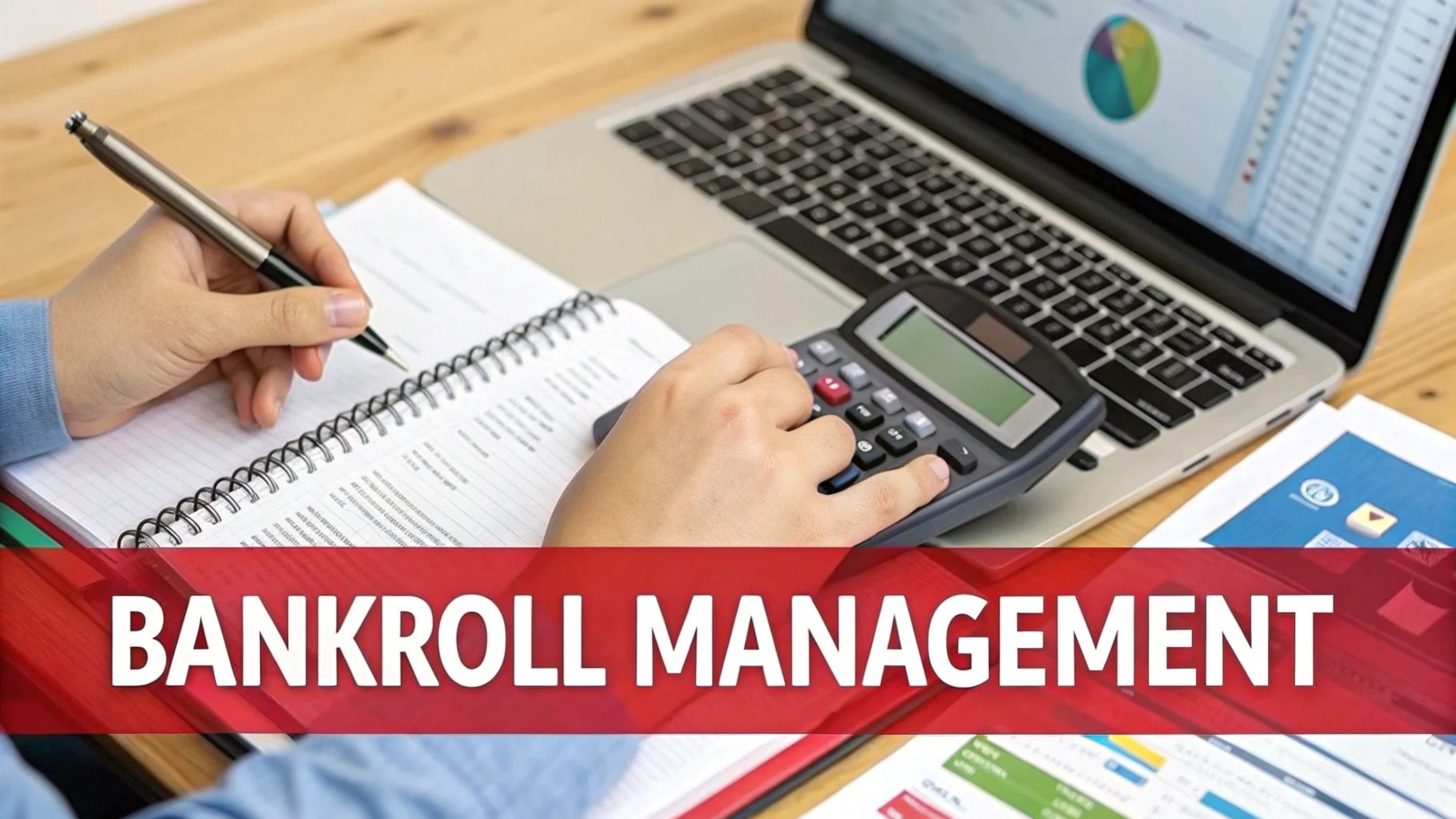
Percentage-Based vs. Flat-Betting Model
The flat-betting model is fantastic because it's so simple. But there’s a slightly more advanced method: the percentage-based model. With this approach, your unit size is always a fixed percentage (say, 1.5%) of your current bankroll.
Let's use our $1,000 example with a 1.5% unit:
- Bet 1: $1,000 x 1.5% = $15.00
- If you win (bankroll is now $1,015): Your next bet is $1,015 x 1.5% = $15.23
- If you lose (bankroll is now $985): Your next bet is $985 x 1.5% = $14.78
This method has two key advantages. It naturally accelerates your winnings during hot streaks (hello, compounding growth) and dials back your risk during cold streaks, protecting what you have left. It’s a bit more work, but it’s a powerful tool for anyone serious about maximizing their edge.
For a deeper dive into these strategies, you can learn more about effective sports betting bankroll management in our detailed guide. Getting these principles down is the first true step toward betting for profit.
Once your bankroll is squared away with a solid management system, it's time to go on the offensive. This is where the real skill of profitable betting comes into play, and it all boils down to one critical concept: value. If you can master this, you’re on the right track to making real money from sports betting.
Just picking winners isn't enough. I see new bettors make this mistake all the time—they back the team they think will win, completely ignoring the price. Value betting is about finding wagers where the odds are better than the actual probability of something happening.
Understanding Implied Probability
Every set of odds has an "implied probability" baked in. This is just the bookmaker's take on how likely an outcome is. Learning to see this number behind the odds is your first big step. It’s easier than it sounds.
For negative (-) moneyline odds, here's the quick math:
Odds / (Odds + 100) * 100
Let's say a team is priced at -150 at a book like Xbet. The implied probability is simply 150 / (150 + 100) * 100 = 60%. The book thinks they have a 60% shot.
For positive (+) moneyline odds, the formula flips:
100 / (Odds + 100) * 100
So, if an underdog is +200 at Sportsbetting.ag, the implied probability is 100 / (200 + 100) * 100 = 33.3%.
Your job is to decide if the true probability is higher than what the odds suggest. If your own analysis tells you that +200 underdog actually has a 40% chance to pull off the upset, you’ve found a value bet. Their real shot (40%) is better than the book's implied chance (33.3%).
A sharp bettor's goal isn't to win every single bet. It's to consistently make plays where the odds are tilted in their favor. Over hundreds of wagers, that mathematical edge is what generates profit.
Developing Your Edge by Finding Soft Lines
Finding value means you need an edge. You’re not going to outsmart a sportsbook like BetUS on a mainstream NFL point spread—those lines are razor-sharp and hammered into place by millions of dollars. Your advantage is found in the corners of the market, on the less popular stuff where oddsmakers aren't quite as dialed in.
Here are a few ways I’ve seen sharps carve out their edge:
- Specialize in a Niche: Become the go-to expert on a smaller market. Think WNBA, college baseball, or an obscure European soccer league. Books simply don't have the resources to set perfect lines everywhere, which creates opportunities for you.
- Focus on Player Props: Forget the final score. Dig deep into player props. If you know a team’s defense is terrible against scrambling quarterbacks, you can find massive value on QB rushing yard props that most of the public completely ignores.
- Bet Early: Books like BetOnline are famous for posting their lines early in the week. If you've done your homework, you can snatch up a great number before the weekend warriors pile in and move the line, killing all the value.
The key is building a simple handicapping process. It doesn't need to be a complex algorithm. It could be as simple as a checklist of key stats you look at for every game in your niche. This forces you to form your own opinion before you see the odds, which is crucial for spotting value.
And when you're looking at underdogs, our detailed guide on strategic betting on underdogs can give you an even deeper tactical breakdown.
The Critical Importance of Line Shopping
Okay, so you've found a value bet. Great. But that’s only half the battle. Now you have to get the best possible price. This is exactly why having accounts at multiple offshore sportsbooks isn’t just a good idea—it’s absolutely essential.
A tiny difference in the odds might seem insignificant, but it has a massive impact on your winnings over the long haul. You wouldn't buy a TV from the first store you walked into without checking the price at Best Buy or Amazon, right? The same logic applies here, but with even more force.
Let’s run through a quick scenario. You’ve done your homework and found an NFL underdog you love. You pull up the moneyline odds across a few of your go-to offshore sites.
Impact of Line Shopping Across Offshore Sportsbooks
This table shows the potential profit difference on a $100 bet by finding the best moneyline odds for an NFL game across different offshore sites.
| Offshore Sportsbook | Moneyline Odds (Underdog) | Potential Profit on $100 Bet |
|---|---|---|
| Bovada | +130 | $130 |
| MyBookie | +135 | $135 |
| BetUS | +145 | $145 |
Look at that. By simply placing your bet at BetUS instead of Bovada, you pocket an extra $15 on a single $100 wager for taking the exact same risk.
Fifteen bucks might not sound like a game-changer, but multiply that difference by hundreds of bets a year. You're suddenly talking about thousands of dollars in pure profit you would have otherwise left on the table. Line shopping is the single easiest way to boost your ROI without getting any better at picking winners.
Executing Advanced Betting Strategies
Once you’ve got a handle on bankroll management and have developed a knack for spotting value, you can start digging into more advanced ways to lock in a profit. We're moving beyond just picking winners here. These strategies are all about exploiting the math and inefficiencies you'll find in the betting market.
To pull these off, you'll need speed, precision, and accounts at several different offshore sportsbooks. But when you get it right, these are some of the purest ways to make money betting on sports.
The global sports betting market is exploding, with projections showing industry revenue climbing from $100.9 billion in 2024 to a massive $187.39 billion by 2030. What does that mean for you? More sportsbooks fighting for your business, which leads to more pricing mistakes for sharp bettors to pounce on. You can read the full research about sports betting market growth to see just how big this opportunity is.
Securing Guaranteed Profits with Arbitrage Betting
Arbitrage betting, or "arbing" as it's known, is pretty straightforward: you bet on every possible outcome of a single game across different sportsbooks to guarantee a small, risk-free profit. This magic happens when books have a serious disagreement on the odds, creating a mathematical edge. It's a game of speed, though—you have to jump on these opportunities before the lines move.
Let’s say you’re looking at a tennis match between Player A and Player B. You're logged into a couple of your offshore accounts and spot a pricing gap:
- Bookmaker.eu has Player A at +110.
- Cosmobet has Player B at -105.
That’s a classic arb. You’d place a $100 bet on Player A at Bookmaker.eu, which would pay out $110 if they win. At the same time, you place a $107.50 wager on Player B over at Cosmobet, which would pay out $102.38.
- If Player A wins: You collect $110 from Bookmaker.eu and lose your $107.50 stake at Cosmobet. That's a $2.50 profit.
- If Player B wins: You cash your $102.38 ticket at Cosmobet and lose the $100 at Bookmaker.eu. That's a $2.38 profit.
No matter who wins, you’ve locked in a small profit. Arbing isn't going to make you rich overnight, but it's pure, undeniable math.
The entire process of finding value is what separates winning bettors from everyone else, as this infographic breaks down.
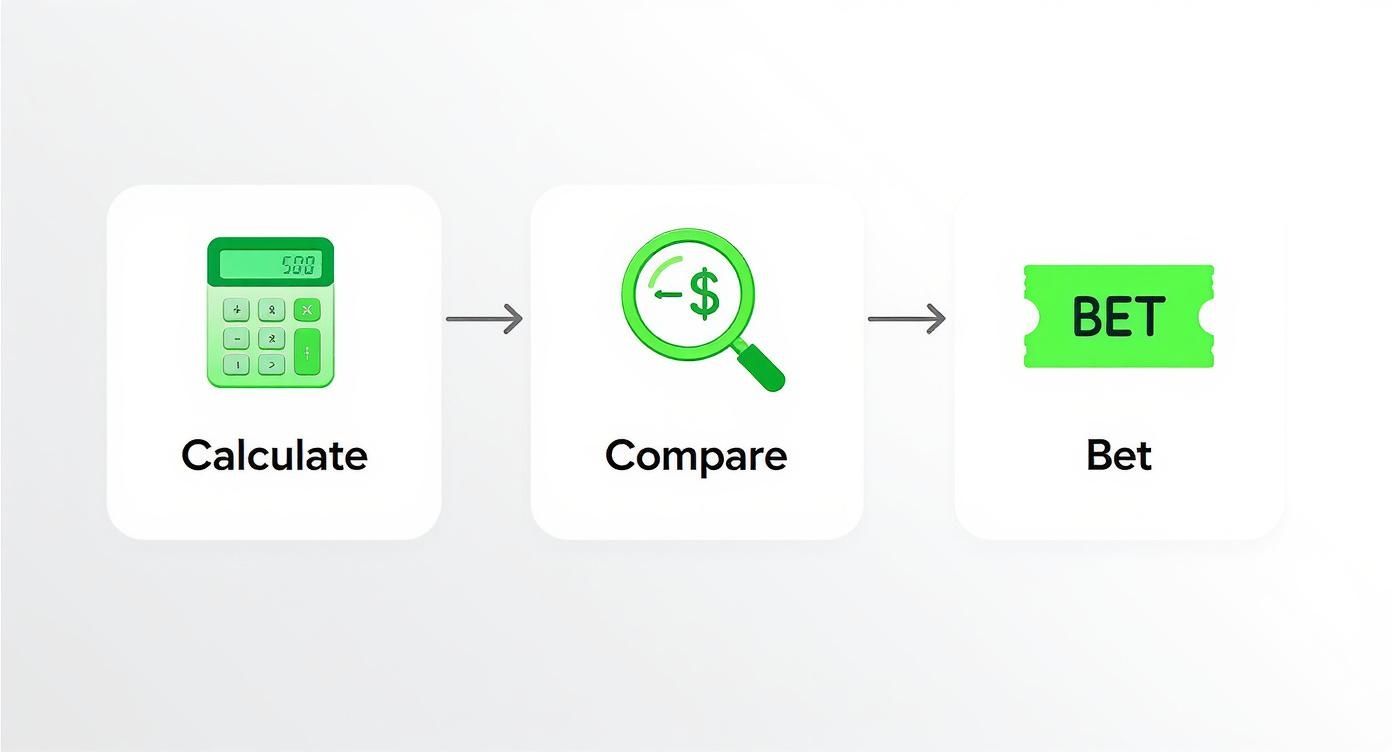
This simple flow—calculate, compare, bet—is the core discipline you need.
Creating a Win-Win with Middling
Middling is one of the most exciting opportunities in sports betting. It happens when a point spread or total moves after you’ve already placed a bet. The goal is to bet on the other side of your original wager to create a "middle" where you can cash both tickets.
Picture this: early in the week, you bet on the Kansas City Chiefs -3.5 at Bet105. Later on, maybe due to an injury report or a flood of public money, the line shifts. You check BUSR and see the San Francisco 49ers are now available at +5.5. That’s your middling spot.
You can now bet on the 49ers +5.5. This creates a sweet spot—a 2-point window (4 and 5) where you win both bets. If the Chiefs win by exactly 4 or 5 points, your Chiefs -3.5 bet wins, and so does your 49ers +5.5 bet. If the final score lands outside that window, one bet wins and the other loses, usually resulting in a tiny loss from the juice.
Advanced strategies like arbing and middling are a numbers game. They demand a deep understanding of odds, the discipline to act decisively, and the patience to grind out small, consistent profits over time.
Protecting Your Wagers with Hedging
Hedging is more of a defensive move. It's used to either cut your risk or lock in a guaranteed profit on a bet you've already made, usually a parlay or a futures wager. All you do is place a bet on the opposite side of your original ticket.
Let's say before the season started, you put $20 on the Boston Celtics to win the NBA Championship at +1000 odds on BetAnything. Fast forward, and they've actually made it to the NBA Finals against the Los Angeles Lakers. Your little $20 ticket is now one series away from paying out $200.
To hedge, you could place a moneyline bet on the Lakers to win the series at a book like Xbet. By calculating the right stake, you can guarantee you walk away with a profit no matter which team lifts the trophy. It takes all the stress out of watching the final games.
FAQ: Making Money From Sports Betting
Even with the right strategies in place, you probably still have some questions floating around. That’s perfectly normal. Let's tackle some of the most common ones I hear to clear things up as you start your journey.
Is It Realistic to Make a Living From Sports Betting?
The short answer? Yes, it’s possible. The honest answer? It's incredibly difficult.
Making a living from sports betting isn’t a hobby; it’s more like being a professional financial trader. You need serious capital, unbreakable discipline, and a highly tuned skill for finding an edge in the market. It becomes a full-time job of grinding out research, analyzing data, and constantly shopping for the best lines at books like BetOnline and Bookmaker.eu.
Only a tiny sliver of bettors ever get to that level. A much more achievable goal for most people is to build a nice side income by following the disciplined strategies we've talked about.
What Is the Single Biggest Mistake New Bettors Make?
Without a doubt, it’s bad bankroll management—specifically, chasing losses. This is the death spiral where a bettor tries to claw back lost money by making bigger and more desperate bets. It's an emotional reaction that almost always ends with a zeroed-out account.
Pros understand that losing streaks are just part of the math. They stick to their unit system no matter what, trusting that their long-term edge will win out. Chasing is the fastest way to turn a strategic plan into just gambling.
How Much Money Do I Need to Start Sports Betting Seriously?
You don't need a fortune, but you absolutely need a dedicated bankroll you are 100% prepared to lose. I can't stress this enough: never bet with money earmarked for rent, bills, or groceries. For a serious start, a bankroll somewhere between $500 to $1,000 is a solid foundation.
The exact dollar amount isn't as important as your commitment to the unit system. If you start with a $500 bankroll, your standard bet should be 1%, which is just $5. It might feel small, but that discipline is what allows you to survive the inevitable downswings and stay in the game long enough to actually learn and grow.
Think of your starting bankroll as tuition for learning the craft of sports betting. Protect it with a strict unit system, and you'll give yourself a real shot.
Which Offshore Sportsbook Is Best for Beginners?
When you’re starting out, a clean and simple user experience is huge. You don’t want to be fighting a confusing platform. For that reason, I usually point newcomers toward sportsbooks like Bovada and MyBookie.
They’re great for a few key reasons:
- User-Friendly Interface: Both sites are clean and intuitive on desktop and mobile. Finding a game, understanding the odds, and placing a bet is a piece of cake.
- Approachable Bonuses: Their welcome bonuses are usually generous and come with clear terms, giving your starting bankroll a nice little boost while you're learning.
- Wide Range of Markets: They have all the major sports, but they also offer a ton of other betting options you can explore once you get more comfortable and start finding your niche.
Starting on a platform that keeps things simple lets you focus on what really matters: mastering your bankroll and learning to spot value. As you get more experienced, you can branch out to other books like BetUS or Sportsbetting.ag to start line shopping like a pro.
At USASportsbookList, we provide in-depth reviews and comparisons of the top offshore sportsbooks to help you make informed decisions. Find the perfect site to start your betting journey by exploring our expert guides and bonus breakdowns at https://usasportsbooklist.com.

